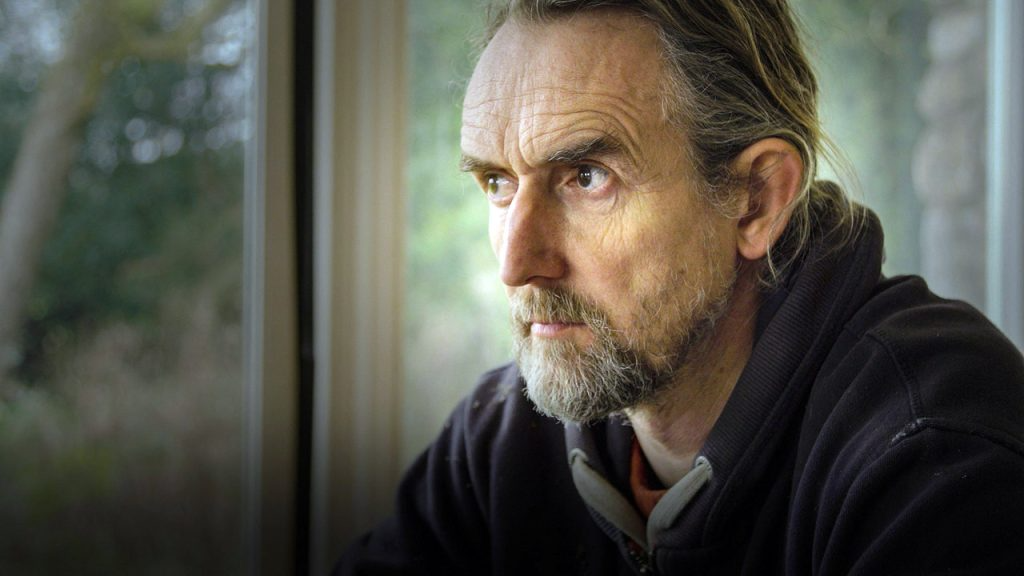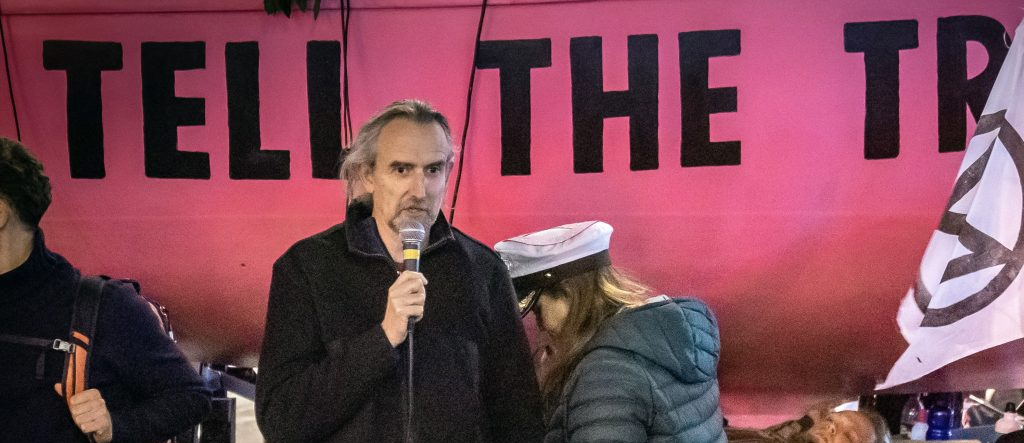🗣️It È il momento della leadership profetica - Intervista
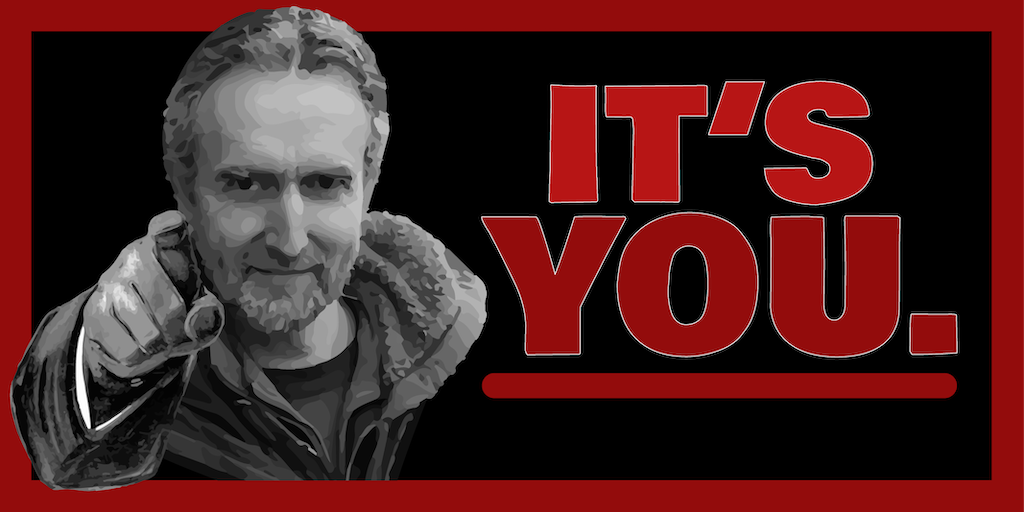
Questa intervista è stata pubblicata originariamente sulla rivista olandese De Volkskrant.
Roger Hallam apre la porta: "Ah, il giornalista".
Il suo salotto, in un piccolo appartamento nel sud di Londra, è pieno di un pianoforte, di librerie, di due biciclette, di una poltrona e di un divano con piumoni e coperte: a quanto pare, qualcuno ci dorme. Le tende pendono allentate da un lato. Hallam offre dell'acqua in una tazza da tè con residui marroni. A proposito, quanto tempo vuole parlare? Ho un'ora di tempo".
Una cavigliera è legata a una caviglia perché Hallam è agli arresti domiciliari: non può uscire di casa tra mezzanotte e le sette del mattino. Di recente la disposizione è stata leggermente attenuata; inizialmente non poteva uscire di casa dopo le dieci. Oggi può andare a trovare i suoi figli, che vivono altrove nel Regno Unito. Una misura politica", giudica Hallam. Molestie da parte delle autorità, proprio come le incursioni della polizia che subisce ogni mese. Prendono i miei dispositivi, mi interrogano, tutto con l'obiettivo di mettermi dietro le sbarre. È un'intimidazione di Stato".
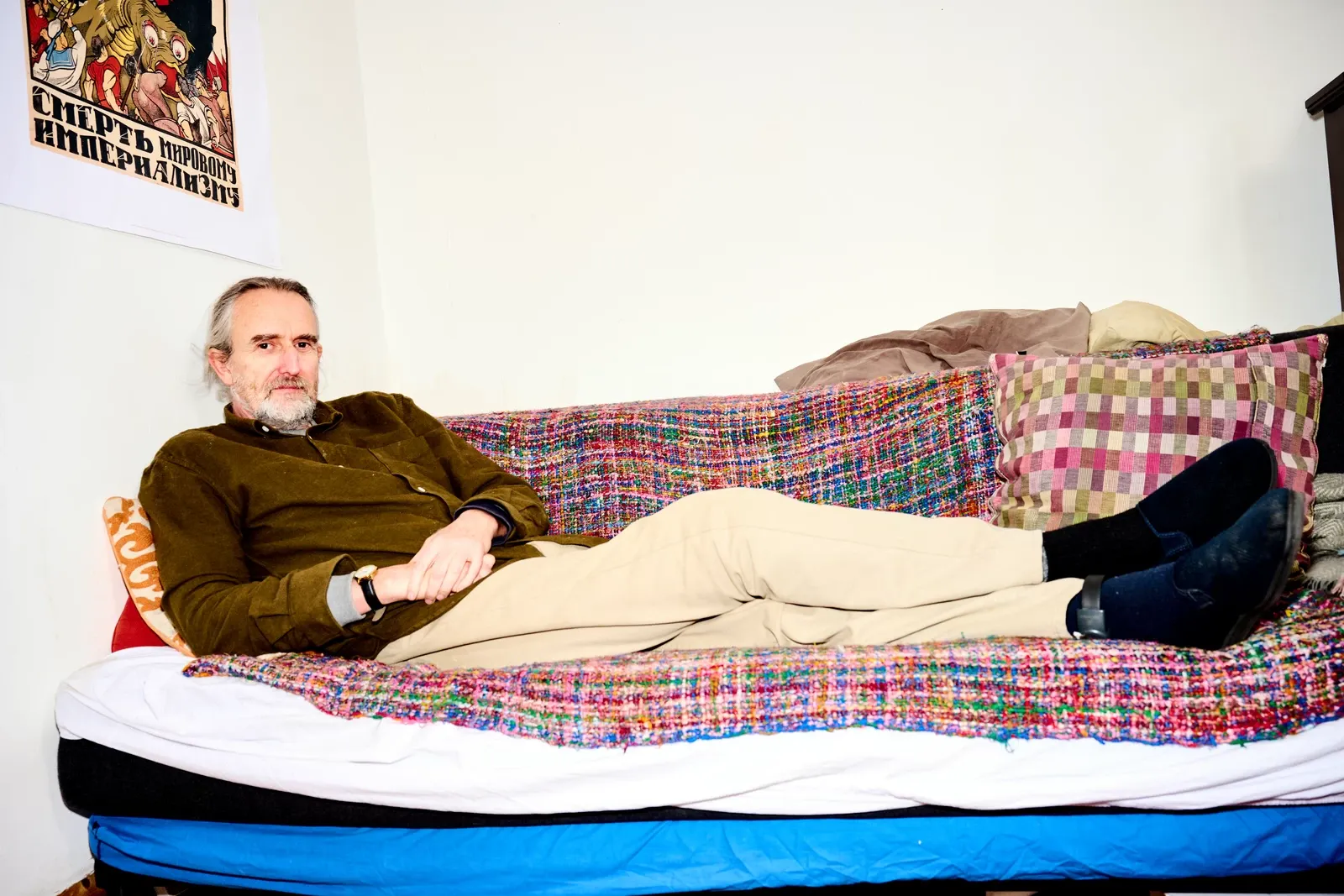
Una settimana prima di questa intervista, è successo di nuovo: il gruppo di attivisti Just Stop Oil ha pubblicato un video di agenti che saccheggiano il suo salotto. Hallam guarda allegramente nella telecamera e fa un pollice in su prima di essere portato via dalla polizia stessa. È diventata un'attività consueta. Si stima che questo sia il suo trentesimo arresto.
Hallam: Questi raid non avvengono perché io chiedo pubblicamente dei blocchi stradali. Se avete guardato i miei discorsi su YouTube, sapete che non lo faccio mai. Io indico la scienza e l'assoluta necessità di resistere. La legge è politicizzata per creare repressione. Ora mi parla di disobbedienza civile. Anche lei è disobbediente civilmente? Sotto un regime autoritario, probabilmente sì. Temo che stiamo andando sempre più in quella direzione qui nel Regno Unito".
Cofondatore di Extinction Rebellion e Just Stop Oil, Hallam è uno degli attivisti ambientali più influenti a livello globale. Si potrebbe considerare la mente dietro il blocco olandese dell'A12 all'Aia, durato 27 giorni e che ha portato a 9.000 arresti. All'inizio di quest'anno, Hallam ha parlato più volte in collegamento video con gli attivisti olandesi. È stato Hallam a dire: dovete tornare ogni giorno. Volevano andare sull'A12 ogni mese, hanno detto. Io ho detto: è fantastico, ma non ha senso. Bisogna farlo giorno dopo giorno. È l'unica strategia coerente".
Just Stop Oil, fondata nel 2022, ha guadagnato fama mondiale dopo che due attivisti hanno lanciato una zuppa sui Girasoli di Vincent van Gogh (dietro un vetro). Ma le azioni sono state numerose, dall'imbrattare edifici e incollarsi ai tubi del petrolio al bloccare le strade. In queste settimane, le "marce lente" a Londra, in cui un gruppo di attivisti attraversa lentamente la strada, hanno provocato un'ondata di arresti. L'interruzione del traffico fa di Just Stop Oil il bersaglio preferito dei politici di destra e dei giornali scandalistici, che parlano di "eco-idioti", "teppisti" e "bande" che ostacolano i cittadini comuni e costano milioni di euro ai contribuenti.
Negli ultimi anni, le azioni degli attivisti ambientali sono state punite sempre più pesantemente. Due attivisti di Just Stop Oil sono stati condannati rispettivamente a 2 anni e 7 mesi e a 3 anni di carcere per aver scalato un ponte, causando la chiusura di un'importante arteria di traffico per ore. Ian Fry, relatore speciale delle Nazioni Unite sui cambiamenti climatici e i diritti umani, si è detto "particolarmente preoccupato" per le condanne, le più alte mai inflitte nel Regno Unito per una protesta non violenta.
Lo stesso Hallam ha trascorso quattro mesi in detenzione preventiva alla fine dell'anno scorso, sospettato di aver partecipato a una cospirazione per turbare l'ordine pubblico. Un discorso degli attivisti di Just Stop Oil era stato registrato di nascosto da un giornalista del tabloid The Sun e fatto trapelare alla polizia, secondo il tabloid stesso: "una vittoria per il popolo". Il giornale ha poi fotografato l'irruzione della polizia nell'appartamento di Hallam: una doppietta, secondo Hallam. L'uomo non era in casa, ma è stato poi arrestato altrove.
Hallam: Non fraintendetemi, vi sembrerà che i Paesi Bassi siano più amichevoli, ma noi siamo solo qualche anno più avanti di voi. Potrebbe andare allo stesso modo per voi". Nei 37 seggi del partito populista olandese di destra Per la Libertà, Hallam vede una nuova prova che manca una storia di "vera sinistra". La "sinistra" neoliberista genera il fascismo", ha scritto Hallam sui social media dopo i risultati delle elezioni olandesi, perché la sinistra si rifiuta di rompere con il capitalismo. Saremo salvati solo dalla vera sinistra, che dichiara: "Tasseremo i ricchi e loro pagheranno per la transizione al carbonio"".
Nelle interviste, Hallam si scontra spesso con i giornalisti britannici, non solo con quelli dei tabloid ma anche con quelli della BBC. Hallam dice: "Perché non vogliono parlare con me di scienza. Ma se tu, come giornalista, non riassumi lo stato più recente della scienza, il pubblico penserà: questo è solo uno strano radicale che dice cose assurde per intrattenerci".
Secondo il rapporto annuale sui gas serra dell'UNEP, l'organizzazione ambientale delle Nazioni Unite, pubblicato alla fine di novembre, l'attuale politica climatica è ben lungi dall'essere sufficiente per rimanere al di sotto di un aumento di 2 gradi Celsius. Secondo gli esperti delle Nazioni Unite, si prevede che la Terra si riscalderà tra i 2,5 e i 2,9 gradi entro la fine di questo secolo. È probabile che si verifichino disastri, come lo scioglimento di parti delle calotte glaciali della Groenlandia e dell'Antartide, con conseguente innalzamento di metri del livello del mare. Il monsone in Africa potrebbe fermarsi, il Polo Nord potrebbe perdere il suo ghiaccio estivo e i ghiacciai delle Alpi potrebbero sciogliersi. Secondo l'UNEP, sono necessarie "una mitigazione spietata e una trasformazione a basse emissioni di carbonio", mentre le emissioni di gas serra sono aumentate dell'1,2% lo scorso anno, stabilendo un nuovo record.
A causa della crisi climatica, con l'attuale politica climatica, la Banca Mondiale ha stimato che 216 milioni di persone dovranno trasferirsi. Il capo delle Nazioni Unite António Guterres ha dichiarato a fine settembre che "l'umanità ha aperto le porte dell'inferno" e ha avvertito che ci stiamo dirigendo verso un "mondo pericoloso e instabile".
Hallam, con una formazione da sociologo, ha lavorato come agricoltore biologico nel Galles meridionale, ma ha smesso quando le piogge prolungate hanno causato la morte dei suoi raccolti. Hallam ritiene che ciò sia dovuto al cambiamento climatico. Nel 2017 si è trasferito a Londra per conseguire un dottorato di ricerca al King's College sulla disobbedienza civile, percorso che ha abbandonato per concentrarsi a tempo pieno sul suo attivismo.
Nel 2018 ha co-fondato Extinction Rebellion con altri, ma si è allontanato dal gruppo un anno dopo a causa di conflitti sulla leadership e sulla strategia. Voleva far volare i droni vicino a Heathrow per forzare la chiusura dell'aeroporto, ma l'azione ha incontrato la resistenza di altri attivisti a causa dei rischi per la sicurezza. Hallam ha negato i rischi, intendendo lanciare i droni proprio all'interno della zona soggetta a restrizioni, ma a distanza di sicurezza dal traffico aereo. Ha proceduto ed è stato arrestato. È in corso una causa legale legata a quell'azione.
Hallam ha anche scatenato la rabbia di altri attivisti quando ha descritto l'Olocausto come "solo un'altra cazzata" nella storia dell'umanità. Diversi capitoli di XR hanno preso pubblicamente le distanze da lui, anche nei Paesi Bassi. Hallam sostiene inoltre che il riscaldamento globale porterà a guerre civili che, a loro volta, porteranno, ad esempio, a stupri di gruppo, omicidi di massa e cannibalismo. Ai giornalisti descrive queste scene nei dettagli: "Prendono tua madre, la mettono sul tavolo e la violentano, poi prendono un bastone e ti cavano gli occhi. Questa è la realtà del progetto di distruzione che stiamo affrontando".
All'inizio del 2022, Hallam ha fondato Just Stop Oil, un movimento esplicitamente incentrato sul disturbo dell'ordine pubblico. La sezione britannica di XR, invece, ha rinunciato alla disobbedienza civile, sostenendo che sarebbe meno efficace, sebbene anche pene più severe potrebbero giocare un ruolo. Hallam la vede diversamente, affermando che le manifestazioni, le petizioni e le pressioni non smuoveranno la politica. Dichiara di non sapere nulla delle recenti azioni di Just Stop Oil, tenendosi deliberatamente a distanza perché sente di essere osservato. Dice: "Penso a distanza alla strategia".
Avete anche parlato con gli attivisti olandesi di XR in preparazione dei blocchi dell'A12. Sono stati un successo? "Oh, sì. Ben fatto. Congratulazioni all'Olanda, che grande Paese".
Poi, seriamente: Ci sono prove schiaccianti che la disobbedienza civile su larga scala è il meccanismo più veloce per ottenere un cambiamento politico. Le manifestazioni che non disturbano sono nel migliore dei casi inutili e nel peggiore minacciose. Se si spendono le energie per fare striscioni e sventolare bandiere, queste non possono essere destinate ad azioni che hanno un senso. Ora vedo manifestazioni di ogni tipo per la Palestina, ma non hanno alcun impatto perché non c'è alcuna interruzione".
Manifestare ha senso solo se si infrange la legge? "Come sociologo, dico: ci sono prove schiaccianti che la 'giusta' protesta non ha alcuna influenza sul potere profondamente radicato, perché il potere non ascolta le argomentazioni".
I blocchi della A12 sono stati sospesi dopo che il parlamento olandese ha adottato una mozione che chiede al governo di sviluppare scenari per eliminare gradualmente i sussidi alle fonti fossili. Pensa che questo sia un buon motivo per fermarsi per ora, o XR avrebbe dovuto continuare?
"Non conosco i dettagli, ma in generale il più grande errore dei movimenti sociali è quello di smobilitarsi prima di aver vinto. Le autorità possono dire di aver accettato una richiesta, ma nove volte su dieci mentono. È così che funziona il potere. Fanno una promessa vaga, così sembra che il movimento di protesta abbia avuto successo e che non debbano più occuparsene, ma poi non succede nulla. Il pericolo è che un movimento di protesta venga demoralizzato in questo modo".
Quando ha parlato con gli attivisti olandesi di XR, ha detto: "Non si tratta di fermare le sovvenzioni alle fonti fossili. È in corso un "fottuto disastro totale" e dobbiamo combatterlo con tutto ciò che abbiamo". Una campagna che si concentra sui sussidi alle fonti fossili è troppo limitata?
"Sì. Il movimento per il clima è inserito in un contesto bianco, borghese, occidentale, urbano, borghese. Non dico che sia tutto negativo, ha pro e contro. Ma nel contesto del progetto di omicidio di massa in cui ci troviamo, è disfunzionale. Non funziona perché il problema del clima non è un problema tecnico causato da una serie di circostanze sfortunate. Questa è una finzione neoliberale: è così che ci è stata venduta negli anni '90 ed è così che il sistema vuole ancora che la vediamo. In realtà, la realtà è che un miliardo di persone morirà. Un dibattito razionale non porterà a una soluzione. Per evitarlo, è necessaria una rivoluzione di massa, a livello culturale, sociale ed economico. Nulla cambierà senza una resistenza civile su larga scala. Il paradigma deve cambiare, anche all'interno dello stesso movimento per il clima".
Il movimento per il clima ha fallito?
"Sì. Innanzitutto perché la posta in gioco durante le azioni è troppo bassa. Devi stare seduto in centro città sulla strada finché non ti arrestano, e il giorno dopo torni. Non ci si ferma. In secondo luogo, la comunicazione deve cambiare: è incentrata sulle emozioni. È un'idea sbagliata dell'Occidente quella di convincere le persone con le argomentazioni. Bisogna fare appello ai loro valori, a ciò che è importante per loro, alla loro storia, alle loro tradizioni. Bisogna far sentire loro che i nostri governi ci stanno infliggendo violenza. L'analogia del mio amico Adam McKay, regista di "Don't Look Up", è stata quella di un meteorite che arriva sulla Terra. Una buona analogia, credo. La gente lo vede ma non fa nulla. Mentre tutti capiscono, guardando quel film, che è folle e criminale non fare nulla".
Lei non sta parlando del problema del clima, ma di un "progetto di omicidio di massa da parte delle élite". Può spiegarlo?
"Il clima è solo il meccanismo che crea la morte. Non parliamo nemmeno del problema dei campi di concentramento; parliamo del nazionalsocialismo, dei nazisti. Non parliamo del problema dei linciaggi, ma dei razzisti. Quindi non dovremmo parlare del problema del clima, ma delle élite che vogliono distruggere la vita di milioni di persone per poter mantenere il loro potere".
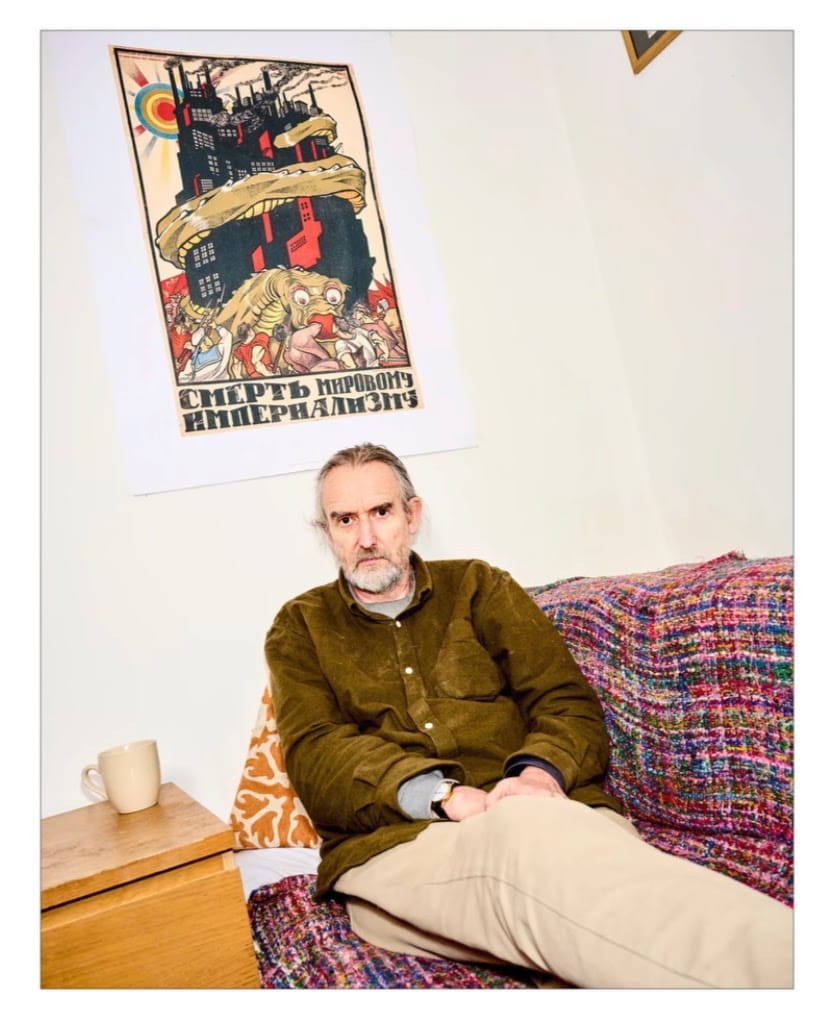
Perché usa la parola "vuole"? L'intenzione non è quella di uccidere milioni di persone.
Non si tratta di omicidio premeditato, nessuno dice: "Non mi piacciono quelle persone nel Sud del mondo, quindi devono morire": Non mi piacciono le persone del Sud globale, quindi devono morire. Quello che sta succedendo è che le élite, e con questo intendo i governi e le grandi aziende, dicono: sappiamo che milioni di persone moriranno, eppure consideriamo il nostro profitto e il nostro potere più importanti. Semplicemente non ci interessa. Se andate da qualcuno nel Sahel e gli spiegate che non si tratta di lui personalmente, ma che morirà perché voi possiate mantenere il vostro potere, pensate che capirà? Non credo. L'incredibile portata, i numeri coinvolti, rendono questo crimine incomprensibile".
Perché sembra difficile fare appello alle emozioni delle persone quando si tratta del problema del clima?
La maggior parte degli attivisti per il clima proviene dalla classe media e non è abituata a gridare. Pensano di poter risolvere tutto parlando. Anche se gridare è necessario. Supponiamo che vostro figlio adolescente si rifiuti di aiutarvi con i piatti. Gli dite qualcosa, glielo ripetete e lui continua a non farlo. A un certo punto, dovete cambiare strategia. Potete, ad esempio, commuovervi, gridargli: cosa cazzo credi di fare? Mi stai deludendo, devo fare tutto da sola! Non sempre funziona e non bisogna esagerare, ma a volte è una buona strategia. Un'altra strategia è quella di imporre una punizione: se non aiuti a lavare i piatti, stasera non esci. Vi garantisco che funziona. A livello sociale, funziona allo stesso modo: il movimento per il clima è il genitore inefficace che continua a parlare".
Lei sottolinea anche l'importanza del sacrificio. Lei dice: noi nel mondo occidentale abbiamo dimenticato di dare qualcosa di noi stessi per il bene comune.
Il corso degli ultimi decenni nel mondo occidentale si discosta molto dal normale corso della storia. In passato, le persone erano consapevoli che, occasionalmente, dovevano dare la vita per un obiettivo collettivo, che fosse la loro tribù, la loro ideologia, il loro Paese o altro. Ora ci troviamo in un lungo periodo di intensa prosperità e stabilità, un periodo forse unico nell'esperienza umana. Di conseguenza, le persone hanno dimenticato cosa serve per garantire la sopravvivenza di una società di fronte a una minaccia esistenziale. Nelle società occidentali si pensa, quando si parla di crisi climatica, di poter realizzare un cambiamento senza sacrifici. Questo dimostra una totale mancanza di consapevolezza storica. Non funziona così".
Una sua citazione: "Per millenni, al centro delle società umane c'è stata la comprensione che la vita è sofferenza. Attraverso questa sofferenza, si diventa interi, e l'interezza è un concetto più profondo e organico di qualcosa di superficiale come la felicità".
Nella nostra cultura, soffriamo di un'idea semplicistica di benessere: è come la contabilità, ci sono costi e benefici. Questo può essere utile per gestire un negozio, ma quando si tratta di psicologia umana, è un'assurdità totale. Si può diventare felici anche sacrificando qualcosa. Quando le persone vengono arrestate per qualcosa che fanno per ideologia ed entrano in cella per la prima volta, si sentono in pace perché difendono ciò in cui credono. Se non si fa ciò in cui si crede, si è sempre sottoposti a un certo grado di tensione psicologica".
Vi siete sentiti tranquilli quando siete entrati in cella per la prima volta?
Non ricordo, onestamente. Ma di certo sono un esempio di persona con poca paura e un alto grado di disponibilità al sacrificio. Sono inserito nella tradizione cristiana, ho letto Kierkegaard e Nietzsche. Ho capito che lo scopo della vita non è la felicità. Lo scopo della vita è condurre una vita significativa, e questo significa sacrificarsi per il bene comune. Che io sia felice o meno non ha importanza".
Non hai mai paura?
Non ho paura della mia paura. Naturalmente, sono piuttosto timoroso. Non mi piace il conflitto e sono timido. Certo, provo ancora paura, anche se devo dire che, dopo alcuni anni di resistenza civile, sono diventato più calmo. La prima volta in cella si ha paura, la seconda meno e alla quinta si pensa: un giorno di riposo. Conosci le regole. Anche se devo dire che quando sono stato in detenzione preventiva per quattro mesi alla fine dell'anno scorso, l'ho trovato terribile. Obiettivamente, è stato terribile. Allo stesso tempo, è stato un privilegio passare del tempo in modo umile con persone private della libertà dalla società, per vedere la loro resilienza spirituale. Non lo romantico: si può avere una grande resilienza spirituale ed essere comunque disposti a uccidere qualcuno. È una delle ambiguità della condizione umana".
Lei accusa spesso i giornalisti britannici di essere parte del problema perché "intellettualizzano" la crisi climatica. Cosa dovrebbero fare i giornalisti?
'Fatti arrestare, come tutti gli altri. Non sto provocando, sono serio. Nella nostra cultura siamo ciò che facciamo: il nostro lavoro. Questa idea è ingenua e assurda; tutti sappiamo che ciò che siamo veramente è qualcos'altro. Una madre, una figlia, un figlio, un padre, un amante, un partner. E, ancora più in profondità, un essere umano, con un senso di responsabilità esistenziale. Non dico che le vostre attività diurne non siano importanti, ma in una vita umana questo è l'elemento più superficiale. Certo, ci vogliono giornalisti, medici, fotografi, politici, attivisti; ognuno ha il suo ruolo. Questo va bene se siamo nel 1995. Ma siamo nel 2023 e la realtà è che moriremo tutti. Quelle specializzazioni non contano più; ora bisogna fare tutto il possibile".
Tutti dovrebbero chiedersi: perché non sono in prigione?
Esattamente! E questo non significa che dobbiate passare tutto il tempo in prigione. Supponiamo che tu partecipi alla disobbedienza civile una volta all'anno, fino al punto di dover andare in prigione. Per il resto del tempo puoi continuare a fare il giornalista e, se ti licenziano, troverai un modo alternativo per essere utile. Solo se i politici, gli avvocati, i giornalisti, i medici, gli agricoltori e i sacerdoti si impegneranno nel movimento per il clima, il movimento potrà avere successo. Ma queste persone sono troppo privilegiate e troppo stupide per impegnarsi".
E forse anche spaventati?
Hanno paura, sì. Ma hanno bisogno di essere sfidati. Quando vedo queste persone alle mie conferenze, dico: siete quelli che hanno più da perdere se la nostra società crolla a causa della crisi climatica. Le persone della classe operaia hanno già una vita inutile. La maggior parte dei suoi lettori sono probabilmente persone istruite e con un lavoro. Voglio dire loro: la scelta non è tra la vostra attuale sicurezza e prosperità e la spaventosa prospettiva della disobbedienza civile. Le opzioni sono: unirsi alla disobbedienza civile o assistere passivamente al crollo della democrazia liberale nei prossimi vent'anni".
Lo accantoneranno. Andrà tutto bene.
È come dire al medico: lei dice che ho il cancro e devo fare la chemioterapia, ma io non ci credo, quindi continuerò la mia vita. Stiamo superando i 2 gradi di riscaldamento e questo significa che un miliardo di persone morirà".
Lei ritiene "essenziale" fare paragoni tra la crisi climatica e l'Olocausto. Perché?
Non credo che abbiamo altra scelta. Quando ho detto che l'Olocausto era "solo un'altra cazzata" nella storia dell'umanità, non l'ho detto per banalizzare l'Olocausto; è una cazzata terribile, terribile, e il mondo è pieno di altre cazzate. Credo che la gente sappia che è vero, se è onesta con se stessa. Una cultura che si trova di fronte a una minaccia esistenziale non può sopravvivere senza un quadro morale. E la cultura morale in Europa è radicata nell'Olocausto. Quindi, quando faccio questo paragone, lo faccio per coinvolgere emotivamente le persone in ciò che sta accadendo ora".
Questo paragone non porta le persone a dire: "Non ti ascolterò più"? Non ti ascolterò più?
Può succedere. Perché la gente si sente a disagio all'idea che qualcosa di simile stia accadendo ora. Ma fare il confronto è il compito dell'attore morale in una società, è il compito del profeta, del radicale. È necessario usare l'immoralità del passato recente per smascherare l'immoralità del presente. Allora la gente moriva per combattere i fascisti. Perché non andate a fermare il fascismo che ci sta arrivando a causa del cambiamento climatico?".
Passare dalla crisi climatica al futuro fascismo potrebbe essere un passo logico per lei, ma non crede di perdere gran parte del pubblico?
Quello che state facendo ora è un eccesso di intellettualismo. La politica si basa sulla retorica, sulle storie. Il collasso della società a causa della crisi climatica è una realtà oggettiva, non la mia opinione. Se non metti l'olio nella tua auto e vai in autostrada, sai che il tuo motore esploderà. Non si sa esattamente quando, ma si sa che succederà. Viviamo in una società globale con un'enorme interconnessione. Se alcuni elementi crollano, le conseguenze si ripercuotono sull'intero sistema, come si è visto con la pandemia COVID-19. Se il clima si deteriora, le conseguenze si ripercuotono sull'intero sistema. Se il clima si deteriora, possiamo coltivare meno cibo, quindi la gente soffrirà la fame. Ci saranno migrazioni di massa, nasceranno guerre. Se ci saranno 200 milioni di rifugiati nel mondo, come previsto, questo porterà al collasso dell'economia mondiale".
Quando parla di collasso della società, guerre civili e fame, ottiene la reazione emotiva che cerca?
No. Spesso mi viene chiesto di dimostrare che la società sta davvero per crollare, cosa naturalmente impossibile. Fare questa domanda, per me, significa che qualcuno è bloccato in un approccio intellettuale, che non si lascia coinvolgere. Ciò che funziona meglio è fare appello al loro senso di colpa: se non fai nulla, contribuisci a questo, e i tuoi figli soffriranno. Il senso di colpa e la vergogna sono potenti motivatori. I vostri diritti e i vostri ideali sono violati, quelli dei vostri figli, quelli dei vostri genitori, quelli delle popolazioni del Sud globale, quelli delle prossime mille generazioni. Continuo a ripeterlo, e molti leggeranno questo pezzo e penseranno: non funzionerà. Questo non attiverà le persone. Nella storia dell'umanità, la maggior parte delle persone non si attiva mai, giusto? Solo l'1% della popolazione francese ha partecipato alla Rivoluzione francese. In piazza Tahrir c'era un milione di persone, mentre 90 milioni di persone guardavano le soap opera. Capisce cosa intendo?".
Il movimento per il clima ha bisogno di un nuovo leader carismatico?
Sì. Una buona leadership strategica, morale, emotiva e carismatica è fondamentale per il successo. Quel leader, o quei leader, devono essere disposti ad andare in prigione. Greta Thunberg deve essere disposta ad andare in prigione. Poi, quando esce, deve dire: è andata bene, ora gli altri devono andare in prigione. Una giornata in strada con 100.000 persone è inutile. Fare dichiarazioni all'ONU è inutile. Quei giorni sono finiti. Il movimento ha bisogno di una leadership profetica. Non solo una leadership alla Greta. Qualcuno che sia proprio come me, o anche meglio".
Qual è la differenza tra un leader profetico e Greta Thunberg?
Un leader profetico si arrabbia, un leader profetico fa discorsi emotivi, piange, grida, fa sentire le persone in colpa, le fa vergognare, diventa emotivo. È una persona del popolo, non un intellettuale. Qualcuno che dice la verità. Deve essere qualcuno disposto a soffrire e a morire per la causa".
Zoom globale su domande e risposte e leadership - 18 febbraio
Nel corso del 2023 ho registrato più di 40 episodi del Podcast Progettare la Rivoluzione e finalmente sta per concludersi.
Ho pensato che sarebbe stato opportuno organizzare una sessione dal vivo, in modo che le persone che hanno ascoltato il podcast e quelle che vogliono saperne di più possano partecipare a questa sessione internazionale di zoom.
La situazione è che tutti sappiamo (nel profondo!) che gli attuali regimi politici non sono destinati a durare, ora che il collasso climatico è stato bloccato. Quindi, dato che le rivoluzioni sono inevitabili, come possiamo progettare trasformazioni sociali che siano pro-sociali e salvino ciò che resta da salvare? Questa è la domanda chiave che affronto in questa sessione.
Iscrivetevi alla resistenza civile nonviolenta con Just Stop Oil nel Regno Unito o attraverso la rete A22 a livello internazionale. In alternativa, è possibile aderire al mio nuovo progetto chiamato Humanity, che mira a costruire il nuovo mondo futuro basato sulla democrazia deliberativa.
